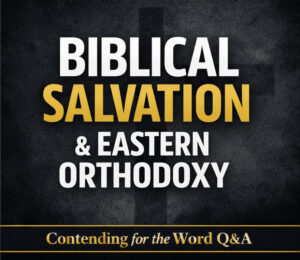⏱️ Estimated Reading Time: 10 min read
 Savor Your Security (Ephesians 5:5–7)
Savor Your Security (Ephesians 5:5–7)
Though we gain strength for the Christian life by savoring our purity and savoring our identity, we ultimately must face the dangers of sin. If we do not recognize the danger, then we are not prepared to live the holy lives God desires. Thus the final dimension of Paul’s exhortation against impurity is warning! But as he warns, he further strengthens us by enabling us to savor our security.
Heed the Warnings (Ephesians 5:5–6)
We feel more secure when we know that we will be clearly warned of danger. Paul provides such warnings in telling us both what is denied idolaters and what is promised them.
What is denied idolaters: inheritance. Paul says that “no immoral, impure or greedy person … has any inheritance in the kingdom of Christ and of God” (Eph. 5:5). In other words, you may think that you will gain by pursuing your lusts and your greed but, in fact, you will lose everything. Certainly Paul is thinking of the kingdom of God in primarily eschatological terms, but the knowledge that Christ is building his kingdom now (Eph. 1:23) makes us mindful that such pursuits will make our lives empty now also. This is made even more clear in the wording of the next verse of this passage about what is inherited as a consequence of these idolatries.
What is assured idolaters: wrath. Paul does not only warn about the denial of an inheritance, but also about what is inherited by those whose lives are idolatrous pursuits of lust and greed. “Let no one deceive you with empty [i.e., void of truth] words, for because of such things [i.e., these vices] God’s wrath comes on those who are disobedient” (Eph. 5:6). The word “comes” is in the present tense. While Paul could have isolated the ultimate consequences of sin in the eschaton, he includes the present. Aspects of God’s wrath come against sin now. This does not mean that the sinful now will face all the consequences of their idolatry, but the emptiness of such pursuits already denies them the joy and fulfillment of a life with God.
What better letter could there be for our age to heed? Consider what Paul has written about immorality and greed in the light of the sins of this age. We live in a culture immersed in immorality and greed. Spiritual warning signals blare from many directions, but, in apparent sensory overload, we grow more blind and deaf to the seriousness, pervasiveness, and destructiveness of our indulgences.
We may tell ourselves and each other that such things do not really matter, that we are unaffected, that we have an adequate worldview to deal with such things, and that mature Christians—grace-filled and culturally engaged—will not be bothered. To such explanations Paul responds, “Let no one deceive you with empty words, for because of such things God’s wrath comes” (Eph. 5:6). Paul is not here threatening that God will abandon or destroy his children (see discussion of Eph. 5:7 below), but he is pointing to the wrath that will come upon those whose ultimate choice is idolatry and using their punishment as an object lesson to warn his children to steer clear of sin. Even if its consequences are not ultimate for the child of God, his discipline of idolatrous pursuits should be sufficient to turn us from evil.
Expose the Darkness (Ephesians 5:11)
What many will now want (and fear), in light of Paul’s warnings, is some standard measurement of the amount of skin, the number or kind of profanities, or the plot categories that will make it clear which entertainments are acceptable and which unacceptable. We may also want to know the maximum amount of personal spending that is allowed before it qualifies as greed. Such rules for all times and places, of course, cannot be constructed. One reason is in this very passage. Down a few verses, we will see that Paul encourages these same Ephesians, “Have nothing to do with the fruitless deeds of darkness, but rather expose them” (Eph. 5:11). How simple life would be if Paul said only the first half of that verse: “Have nothing to do with …” Then we could simply resign and retreat from our culture. But Paul also says, “rather expose the fruitless deeds of darkness.” How can you do that if you do not know something of the culture?
The requirements to heed the warning against sin and to expose the darkness in which it thrives, puts every Christian in the so-called Puritan dilemma of needing to be “in the world but not of it.” Seeking to engage, rebuke, and redeem our culture remains a battle of conscience and responsibility. The battle will test us until Christ returns. But we cannot achieve any measure of victory in the battle if we simply abandon biblical instruction. Sociologist Alan Wolfe in The Transformation of American Religion writes, “Christians and Jews … have ignored doctrines, reinvented traditions, switched denominations, redefined morality, and translated their obligation to witness into a lifestyle.” As a result he concludes that America is pervasively religious but that religion is neither reshaping the culture nor providing any danger warnings to its adherents.
Paul cautions instead that there can be no true morality without piety, no real witness without purity, no significant revival of the soul when there is regular compromise of the heart. The kingdom does not progress where idolatries of lust and greed predominate. We have to decide, as one writer puts it, whether we will “practice the culture” or “practice the faith.” Deciding how to engage in the battle for our hearts, our culture, and our children will not be easy, but we have an authority and the witness of the Spirit in our hearts. Paul says that in order to expose the darkness, we will need to give of ourselves and die to self, but such is the nature of war. Our identity as well as God’s warning motivates us to pursue holiness, but the warning will not accomplish its purpose if we do not fully understand its context. Even the warning comes out of a heart of love.
Love God’s Warning (Ephesians 5:7)
As we read these awful warnings against impurity, we must put ourselves in the place of the Ephesians. They are surrounded by sexual and material temptations that have captured them in the past and tempt them in the present. Without question there are those in the churches who are continuing to struggle with these idolatries, or else there would be no reason for Paul to address such matters. But how are the Ephesians to deal with these warnings? They are to receive the warnings with love because they are expressed with care and measure.
What is the motive of God’s warning? Remember that he is warning his children, his holy ones. He is warning those dear to him of their danger, but this is itself a sign of his love. If he did not love, he would not warn. Always we are to understand that an aspect of the grace of God is his zeal to warn us of the consequences of sin. Were he only a God of retribution, then he would relish the harm that comes to those who cross him. But here he speaks to those already bought by the blood of his Son, and who yet trample his blood underfoot by their sin, warning them to flee from the consequences of their sin. The motive for such a warning to such people as these can only be love.
The love is underscored by the careful measurement of the warning. What is its extent? The warning never extends to rejection. Consider carefully the final words of this passage. Paul warns the Ephesians that God’s wrath comes upon idolaters and says, “Therefore do not be partners with them.” Note the careful use of the third person “them.” Paul does not say, “Therefore disinheritance and eternal wrath will come upon you.” He clearly warns that idolaters will experience wrath, and so he warns the believers to stay away from—not partner with—them and their practices. But even though the Ephesians surely have sin in their lives, the apostle does not say, “You are one of them.”
Paul spares the believers the greatest consequence of sin, which is being identified by it. Paul never makes idolatry the identity of the believers. They remain holy ones who are the children of God. The words echo those from John’s epistle: “How great is the love the Father has lavished on us, that we should be called children of God! And that is what we are!” (1 John 3:1). In a similar way Paul speaks here to the Ephesians as if to say, “Behold what manner of love the Father has lavished upon you that you should be God’s children, his holy ones. That is what you are.”
In Flannery O’Connor’s short story “A Temple of the Holy Spirit,” an adolescent girl is visited by two older teenage cousins who want to introduce her to more sophisticated and adult interests. At one point the girl overhears her older cousins mock a nun who has suggested a formula to help young women stop the advances of young men. Sister Perpetua advises that the way to fend off a young man in the back of a car is to say, “Stop, sir! I am a Temple of the Holy Ghost!” The older cousins find this advice hilarious. The younger girl, however, is deeply moved. The news that she is the dwelling place of God fills her with a sense of awe. She savors what it means to be so special to God that he would give her such a gift, and the knowledge of being so treasured by God makes her desire to live her life in thanksgiving to him. The adult sophistications that were so appealing still have their allure, but now she knows that they are out of place for one made to be the holy dwelling of God.
Paul has said to these Ephesians already that they are a temple of God (Eph. 2:21), and now he says that they are his children, his holy ones (Eph. 5:1, 3). This is the knowledge that is to fill them with praise and make out of place the impurities and idolatries of the world. They are no longer made in such a way that these things of the world can bring satisfaction; these things will, in fact, bring greater pain. These same dynamics will occur in our lives, so Paul seeks to overwhelm us with the savor of our identity, the blessings of purity, and the warnings of grace. We are to imitate God because we are his children. Nothing else will do any more; nothing else will satisfy. Paul tells us that as an odor of a sweet savor to God, we should be what we are. We are his children and we are saints. So we should live that way!




